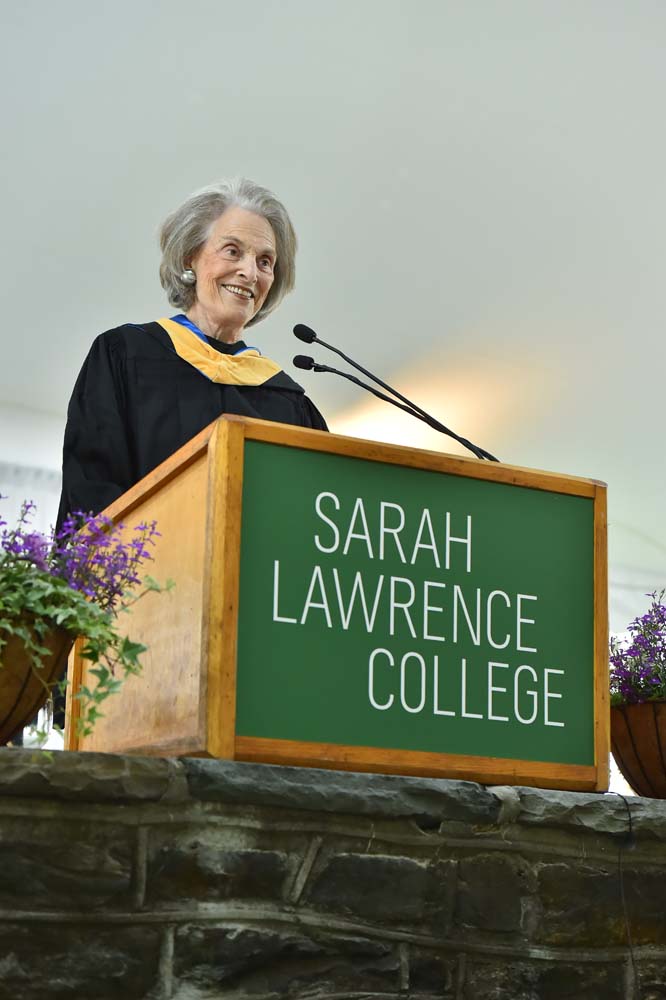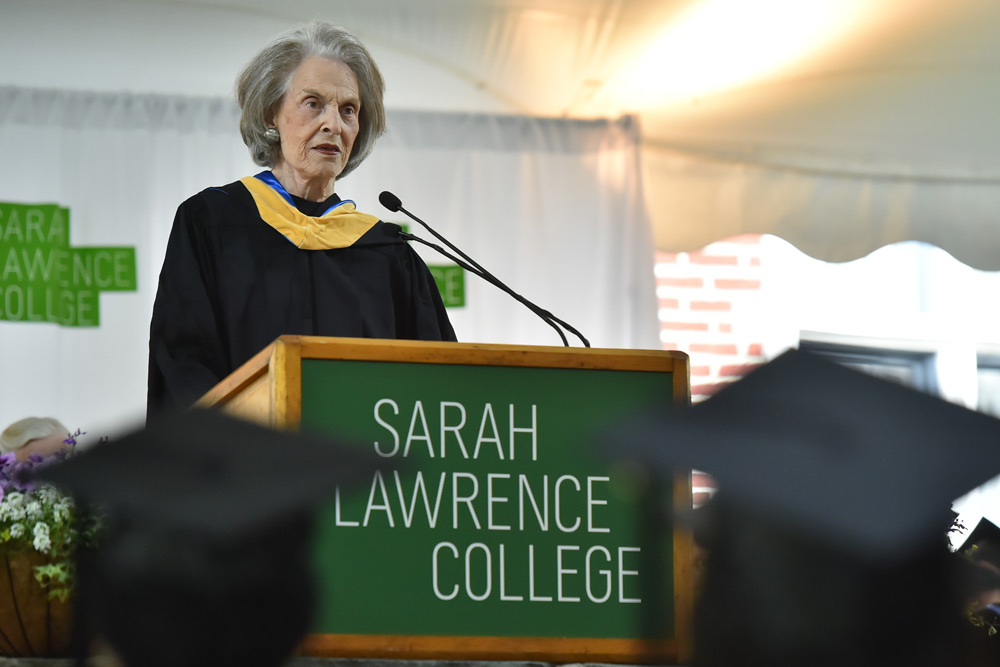Introductory remarks from Judith Babbits, Dean of Graduate & Professional Studies

The program was started by Melissa Richter, and Joan joined it in 1972. She served as director for 26 years until 1998. Under her leadership, the program attracted both students and faculty from around the country and the world. Her vision was to train students to understand both the scientific principles of medical genetics and to possess the social and psychological skills to counsel families and individuals about the genetic basis of their conditions. The genetic counseling program at Sarah Lawrence quickly became distinguished for just this interdisciplinary approach, still a hallmark of a Sarah Lawrence education for both undergraduate and graduate students.
What happened next amazes me. Several years after becoming director of the Human Genetics program, Joan developed a second master’s program at Sarah Lawrence, the Master in Health Advocacy, and she directed both health programs for many years. Originally the focus for Health Advocacy was on preparing students for the field of patient advocacy and was very much rooted in the hospital settings. Since the 1980's, however, HAP graduates have brought innovations to a wider community in the areas of research, policy and planning, and direct service—all to fulfill the needs of the expanding world of health.
It is not surprising that Joan infused both programs with a humanistic perspective, for she, herself, was educated in that liberal arts tradition at Sarah Lawrence. Upon graduation from the college, she attended Simmons College in Boston and earned a master’s degree in social work. Before joining the genetic counseling program at SLC, she worked as a psychiatric social worker at several major New York hospitals.
The Sarah Lawrence educational model of genetic counseling that she developed has been imitated around the world. If you talk to Joan, she will tell you stories of her struggles to raise money and gain support from foundations and other funders for a fledging medical program at a small liberal arts college. She quickly became known for her vision and commitment to the field and was appointed to many policy-making task forces and commissions, among them the American Board of Internal Medicine, the American Academy of Physicians and Patients, and the Women's Health Initiative of the National Institutes of Health. She has also chaired the ethics committee of the National Neurofibromatosis Association and is a member of their Clinical Care Advisory Board. Currently is she also co-director of The New York Breast Cancer Study, a research project examining the role of breast cancer genes in increasing the incidence of breast cancer in Ashkenazi Jewish women.
In 2003, she received the Award for Excellence in Human Genetics Education bestowed by the American Society of Human Genetics. She was the first woman and first non-medical doctor to receive this prestigious award. In 2012, she received the Natalie Weissberger Paul Lifetime Achievement Award, the most distinguished honor given by the National Society of Genetic Counselors.
She was a founding member of the Genetic Counseling Foundation, established by National Society of Genetic Counselors.
Joan Marks is the author of The Genetic Connection: How to Protect Your Family against Genetic Disease, and editor of Advocacy in Health Care: The Silent Constituency.
Joan has been called a visionary, a pioneer, and the “mother” of genetic counseling. To us she is all that, and most important, she is the founder of a community of Sarah Lawrence graduates that see themselves as leaders in their field and look to Joan as their role model.
Please join me in welcoming Joan H. Marks.
Joan H. Marks
 What a wonderful day this is—for you and for me!
What a wonderful day this is—for you and for me!
For the genetic students, I believe this is the largest group ever to be honored. I am also impressed with how the Health Advocacy field has expanded and is making contributions to diverse areas of health care.
I am impressed with all the graduate programs here from those I know best to the newest in Dance/Movement Therapy.
When the Human Genetics Counseling Program was started at Sarah Lawrence in late 1968, it was the first such graduate program in this country.
Actually, Sarah Lawrence has spawned other groundbreaking programs including the Health Advocacy and Women’s History Graduate Programs and a laboratory pre-school where students in the Art of Teaching and Child Development Graduate Programs integrate practice with theory.
In 1968, many changes were taking place in our world. The discovery of the genetic code was only less than 15 years old—so to speak—since the double helix structure of DNA had only been known since 1953. Our Human Genetics Program was revolutionary as it was designed to translate the explosion of genetic information becoming available in ways that could directly benefit patients and their families. After all, what good is all this knowledge about DNA and genes and genetic diseases if it doesn’t reach the patients?
Our challenge was to figure out how to translate complex and often controversial data into messages that patients and their families could absorb and integrate into their lives and to make informed decisions about life and death matters. Truly, without genetic counselors, patients and their families are often left afloat like a boat without a sail.
Another challenge for the counselor is how to help patients and their families navigate the often byzantine and always overwhelmingly complex health care institutions and systems. The patient advocacy program was born to provide patients and their families with informed professional partners to guide and help make choices to obtain the best quality care in the most efficient way.
It has not always been easy. Creating new programs in the context of the venerable health care system requires a pioneering and often maverick spirit both for those who teach and those like yourselves who do the learning.
Shortly after the Human Genetics Program was going full force, I had invited a group of distinguished geneticists from many parts of the country to review our students, faculty, and curriculum, as well as to hear about the diversity of our field placements. At the last moment, I realized I should have also invited the President of Sarah Lawrence, Dr. Charles DeCarlo, a mathematician who had led IBM’s effort to introduce computers into the business world, and as President of the College, helped bring many changes to the campus.
He belatedly joined this group at lunch-time and learned how impressed the geneticists were with our curriculum and field placements. I was smiling until he went on to say to the visiting geneticists “why would you approve of this program at Sarah Lawrence which has so few courses in science?” Several of the invited professors laughed and told him in response, “Dr. DeCarlo, if one of our own universities considered a program like yours in Genetic Counseling, it would result in years of arguing among the faculty and eventually the concept would have been abandoned. Sarah Lawrence is making history here—like nowhere else!” Everybody laughed and felt quite pleased with the discussion! And the program survived!
Not everything has been roses though. For example, over the years I have made several attempts to broaden our genetics program by seeking government funding to recruit minority candidates to the programs, but sadly this has not been very successful. One of my biggest disappointments has been that I wasn’t able to get more federal funding to improve diversity in the Sarah Lawrence program.
As the genetic counseling program grew, a group of counselors from around the country, along with leading geneticists, realized that each state needed to broaden their own counseling program for patients. However, it became apparent that in order to do so they needed significant funding to meet these needs.

I had no choice but to remain in the stall waiting for them to leave!!! When I was finally able to escape the ladies' room, I rejoined the review group and continued all day to fight hard for funding for the genetics programs. I am pleased to say that by the end of the meeting, many states were funded, including New York State, of course!
Over the past 35 years, the aspect of the Sarah Lawrence program of which I am most proud is that it has kept abreast of the rapidly growing field of human genetics. There is probably no other area of clinical medicine that has made such rapid and meaningful progress for contributing to the care of patients.
To the graduates of the genetic counseling program: You are entering your careers at a time of unprecedented advances in medicine almost at every level. At the same time, this explosion of information puts even more challenges on your shoulders as the complexity of the information that you need to be able to absorb and master increases. I have watched this field grow for nearly 50 years and my advice to you is to revel in the fact that there is so much you can offer to patients and families—so much more than we could 50 years ago. You can literally save lives and give life with the power of your knowledge—use it wisely and compassionately—and always keep the interests and needs of the patients and their families foremost in your work.
But whether you are commencing to be a genetic counselor, a health advocate, a dancer, an actor, writer, teacher, historian, a therapist—or a social worker, as I was once—one thing every student at Sarah Lawrence has in common is the knowledge that what you learned here will enable you to go out and make the difference you want to make in the world.
I thank you for dedicating your lives to pursuing careers in such worthy pursuits as you have chosen. Each of you will impact positively on the lives of many, many people. This is both your gift to the world and a gift to you as well, so embrace the challenges and, especially during hard times, cherish the rewards.